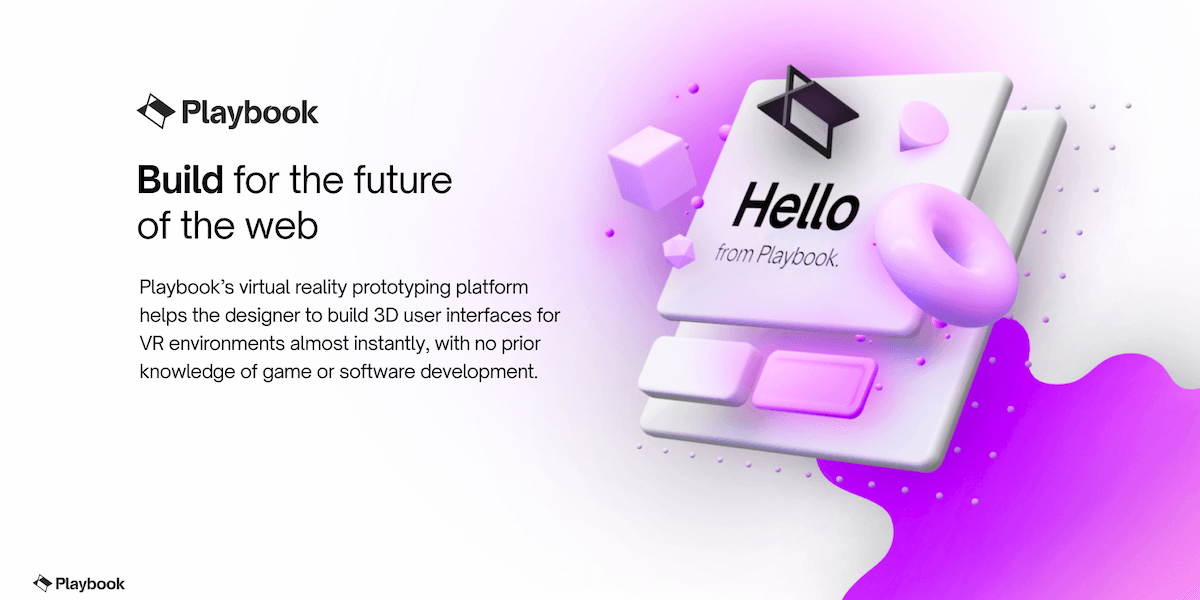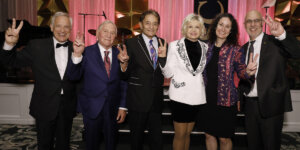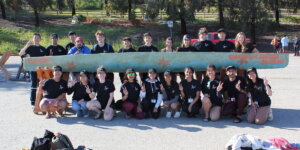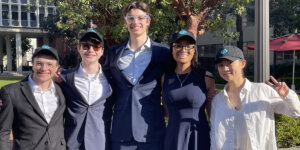
Playbook VR is one of twelve teams competing in this year’s MEPC. (Image Courtesy of Playbook VR)
To many of us, virtual reality (VR) might seem like a concept straight out of a futuristic science-fiction film. But the recent explosion in VR technology and apps tells a different story: the “age of VR” is already here.
VR has the potential to completely revolutionize how we use and interact with technology, making it a promising and exciting space for future-looking developers. The technology has applications ranging from gaming and entertainment, to healthcare, retail, tourism, military training, education, and more. But the novelty of this technology means designing for the virtual realm can be really challenging. The process can be frustrating and messy- it requires a lot of programs and coding knowledge, and there are few established standards or guidelines. Web and mobile app designers interested in getting started with VR may find that their two-dimensional design skills aren’t applicable to designing for immersive three-dimensional environments.
Members of the startup Playbook VR, a team in this year’s Maseeh Entrepreneurship Prize Competition, or MEPC, believe they have a solution.
The Playbook VR team – which consists of Ryan Mitchell, a senior at USC Viterbi majoring in computer science; JD LeRoy and Skylar Thomas, both seniors in the USC Iovine and Young Academy; and Steph Ng, a lead AR engineer at the USC Immersive Media Lab who graduated from the USC Iovine and Young Academy last spring – hopes to create a simple, intuitive VR design tool that will allow anyone to build VR experiences, without requiring coding or other background knowledge. According to Thomas, Playbook provides VR developers with an easier, cleaner way to design and build VR experiences. For the traditional web designer who wants to move into the VR space, Playbook offers transitional tools and training to help bridge the gap from designing in 2D to designing in 3D.
To validate their concept and understand customer needs, the members of Playbook VR have joined MEPC. Over the next four months, Playbook VR and 11 other USC Viterbi student-led teams will work to perfect their business plan, partnering with mentors to guide and advise them, and attending workshops on topics like customer discovery, intellectual property, and pitching to investors. The National Science Foundation Innovation Corps (“I-Corps”) program will provide the workshop curriculum.
“We’re still in the early stages right now,” said Playbook VR team member JD LeRoy. “We have a prototype developed, but we still have a lot of logistical questions about fundraising and legal aspects and all of the other elements we need to consider in order to bring Playbook to the market. We’re really looking forward to getting some of these questions answered through the MEPC.”
Added Playbook team member Thomas: “We’re excited to have the chance to connect with other founders, as well as to get access to all the support and resources USC Viterbi has to offer.”
On Tuesday, Dec. 7, the 12th anniversary edition of the MEPC held its official kickoff over Zoom. At the event, the aspiring entrepreneurs met for the first time with their team mentors, who will support them as they translate their ideas into viable companies.
“This competition aims to inspire USC Viterbi students to develop solutions to many of the world’s challenges by helping them to cultivate an entrepreneurial mindset and providing them with the tools they need to turn innovative ideas into successful startups,” USC Viterbi Dean Yannis Yortsos said in his opening remarks.
“The purpose of the MEPC is to get students to think like entrepreneurs,” said Denise McKenzie, who will serve as a lead instructor in this year’s competition. “Oftentimes founders, especially engineers, develop a great technology or service without thinking about where it might fit into the market. The MEPC helps founders understand the needs of potential customers and create customer-based solutions.”
McKenzie, an instructor for the NSF I-Corps Program and a lecturer at USC Viterbi, will lead this year’s program alongside Hovig Tchalian, an assistant professor of clinical entrepreneurship at the USC Marshall School of Business, and Rob Schoeben, an adjunct professor of entrepreneurship at the USC Marshall Lloyd Greif Center for Entrepreneurial Studies.
At stake in the competition is a $50,000 grand prize, along with access to free legal services, offered by DLA Piper, for the top four finalist teams. Each of the twelve teams will also receive a $500 grant for customer discovery. This year’s finals will take place on April 29, 2022.
The 2021-22 MEPC cohort includes startups in fields ranging from artificial intelligence, to healthcare, to real estate.
Nullanet, for instance, aims to make artificial intelligence ubiquitous at a low cost. InSpecula, LLC will work to refine the design of the vaginal speculum to improve patient experience during pelvic examinations. RealExchange hopes to empower home buyers to navigate and manage the home buying process on their own. MicroMaterna strives to reduce preventable childbirth-related deaths due to preeclampsia, specifically, but not exclusively, in low-resource settings.
“We joined the MEPC because of its reputation for mentorship and guidance, as well as its historical propensity for developing outstanding products,” said Nick Enriquez, a junior majoring in biomedical engineering at USC Viterbi and a member of the MicroMaterna team.
“We hope to be able to bring our unique expertise and goals to this year’s cohort, and to develop our product and successfully reduce maternal mortality,” he added. Enriquez is joined by three other USC Viterbi BME students – Kristian Bostic, Sabrina Sy, and Vy Ho – to complete the MicroMaterna team.
MEPC, founded in 2010 thanks to a $1 million endowment from entrepreneur Fariborz Maseeh, has become one of the university’s premier business model competitions for USC Viterbi and other students, faculty, and other would-be business builders. To bring more business education to the contest, USC Viterbi partners with the Lloyd Greif Center for Entrepreneurial Studies at USC Marshall.
Over the past decade, MEPC has launched several promising companies.
The 2021 MEPC winner, Watershield, created a bio-inspired water barrier, made of silicone-based polymers that adhere to the skin without the use of any chemical irritants, to provide cancer patients with a more comfortable, infection-proof shower experience.
The 2020 MEPC winner, GrayMatter Robotics, uses AI to create smart and rapidly deployable robotic assistants to automate high mix manufacturing tasks, improving quality of life for industrial workers, and increasing productivity. The 2019 victor, AIRBOND, now called Apogee Composites, designed a cheaper, more efficient way to produce carbon fiber composite materials for the aviation and other industries.
Thermal View Monitoring, the 2017 winner, developed an image guidance system that provides a real-time, 3-D temperature map during thermal ablation therapy, saving significant time and money by enabling physicians to take quality images right in the operating room. AesculaTech, the 2016 runner-up, develops and manufactures a platform of temperature-responsive smart materials for use in medical devices, including the treatment of dry eye. After MEPC, AesculaTech received an invitation from Y Combinator, the famed Bay Area business incubator.
Second Spectrum, the 2013 winner, analyzes big data for insights into sports performance, such as what constitutes good defense and offense in basketball. Currently, all NBA teams receive Second Spectrum optical tracking data, which powers next-generation analytics.
Published on January 3rd, 2022
Last updated on January 3rd, 2022












